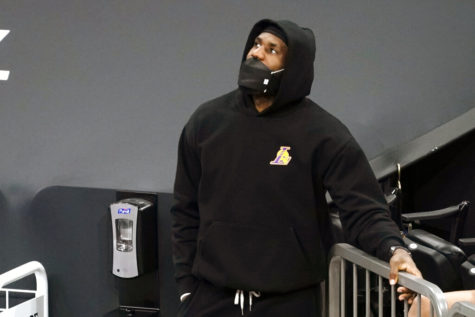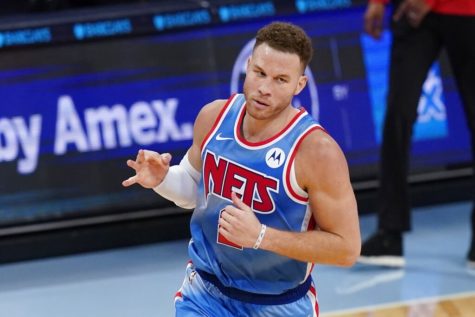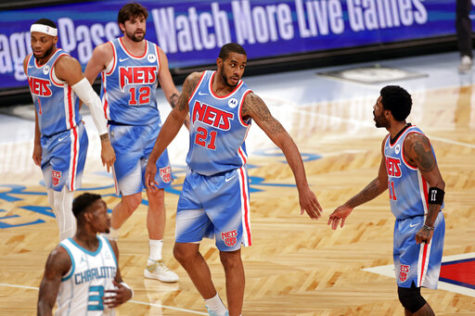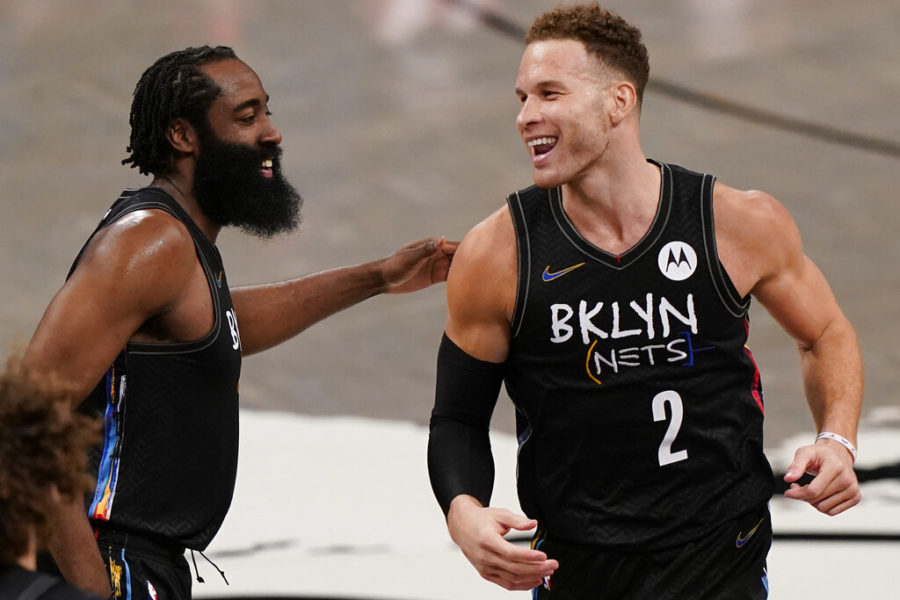Buyouts have broken the NBA
Kathy Willens | Associated Press
Brooklyn Nets guard James Harden (left) congratulates new teammate Brooklyn Nets forward Blake Griffin (right) March 21, after Griffin scored his first two points as a Net during the fourth quarter of an NBA basketball game against the Washington Wizards in New York.
April 3, 2021
The NBA is broken — again. The past decade plus of NBA basketball saw some of the most talented rosters ever constructed, with the sole purpose of taking down whatever “superteam” preceded them. Now the league has a new superteam problem, and it’s all thanks to buyouts.
The current state of the buyout market has stripped the NBA of its new-found and short-lived parity the league and its fans had so desperately wanted. The small-market team gets hurt the most by this manipulation of contract buyouts. It’s hard enough for teams like the Utah Jazz or Milwaukee Bucks to attract talent through free agency — even with both franchises being very competitive for the first time in over a decade. Now these small market teams are essentially being put out of competition through an unfair, unregulated and yet completely legal use of the buyout market. Use of the buyout market to build superteams in the latest strategy in this nearly 15-year trend.

From the 2007-08 Boston Celtics that gave rise to LeBron James and the early 2010s Miami Heat, on to the Golden State Warriors and Cleveland Cavaliers of the mid-to-late 2010s, superteams mostly dominated the last decade. They created an imbalance of competitiveness rarely seen in NBA history, where only very few teams in each conference were considered actual title contenders on a season-to season basis.
However, in 2019 the Warriors led by All-Stars Kevin Durant, Stephen Curry, Klay Thompson, Draymond Green and DeMarcus Cousins fell apart due to multiple injuries. The Warriors dynasty was ended by Kawhi Leonard and the mostly home-grown Toronto Raptors in the NBA Finals.
Leonard then made his way to the Los Angeles Clippers in free agency, while Durant left the Bay Area for the Brooklyn Nets. Balance to “the Force” that is the Eastern and Western Conferences was once again restored, and the era of superteams was over; or so we thought.
At the start of the 2020-21 season, the Nets featured a cast of mostly in-house drafted and developed talent to bolster Durant and fellow superstar Kyrie Irving. Then on Jan. 14, most of those players were traded away to bring in James Harden, arguably the best player in the game right now. The Nets had created a new superteam.
For many, they saw this move as one that made the Nets the favorite to come out of the East and win the 2021 NBA Finals. Three superstar players, two being arguably top-five players in the league. The Nets didn’t stop there, as they began to take advantage of a newer tactic to improve their roster midseason without giving up assets; through the buyout market.
Now to be clear, players being bought out of contracts is nothing new. However, since the most recent Collective Bargaining Agreement increased the salary caps league-wide in 2016, several franchises have been signing massive contracts to players that haven’t lived up to them, whether through injury/regression, or the fact the player was overpaid to begin with.
This has led to a lot of buyer’s remorse in recent years, where franchises will buy out massive contracts of players who no longer fit the team, or to appease players no longer happy in their current situation. Not all of the players bought out are difference makers, but some of these bought-out players are very good players. This is where former All-Star power forward Blake Griffin comes in.

Griffin was at one point an All-NBA superstar for the Clippers and Detroit Pistons. The last two seasons have seen him deal with lower-body injuries that had seemingly sapped most of the explosiveness and athleticism that made Griffin an All-Star. The Pistons bought out Griffin on March 5, making him a free agent, which means he could sign with any team that would take him. On March 7, the Nets picked him up for a measly $5.9 million, a far cry from his $56.5 million over two years remaining with Detroit. The Pistons will still pay him $29.8 million next season, according to an ESPN article.
Since joining the Nets, Griffin has put together some solid performances, proving he still has some of the talent that made him an All-Star, while only taking up a small percentage of the Nets’ cap space.
After the NBA Trade Deadline, the Nets then went out and picked former All-Star forward LaMarcus Aldridge off of the buyout market on March 28. With Aldridge joining the fray, the Nets feature six current and former All-Stars, with a combined-41 selections and 31 All-NBA selections. Each player has made an All-Star game since 2017. The Nets have constructed arguably the most-talented team ever outside of a Team USA Olympic team.
The Nets aren’t alone, however, in taking advantage of the buyout market. The Los Angeles Lakers signed Andre Drummond, a 27-year-old two-time All-Star center, after being bought out by the Cavaliers. He joins the king and godfather of superteams himself in James and eight-time All-Star forward Anthony Davis in the Lakers’ quest to repeat as champions. Provided James and Davis overcome their recent injuries, it’s essentially a two-team race for the 2021 title.

It’s the fans that will continue to be hurt the most. Superteams have led to an era of impatience among franchises and players. With teams hurrying to get over the hump, dismantling cores that otherwise normally would’ve stayed together for most of a decade has become commonplace. Fans miss out on connecting with the players and vice versa, only to see their stars become part of some other franchise’s title run.
It’s not just the franchises’ fault either; the players play a massive role in this. No longer do we live in an era where most players want to compete and grind for a ring. If they face adversity early on, players seem more likely to jump ship and take an easier path to winning. We’ve seen players like James and Durant do it multiple times, and the generation after them is following right in their footsteps. If they can force their way into a buyout situation, they’ll likely take the path of least resistance. The NBA must do something about the buyout market, because if it doesn’t, we will never have a truly competitive league ever again.







